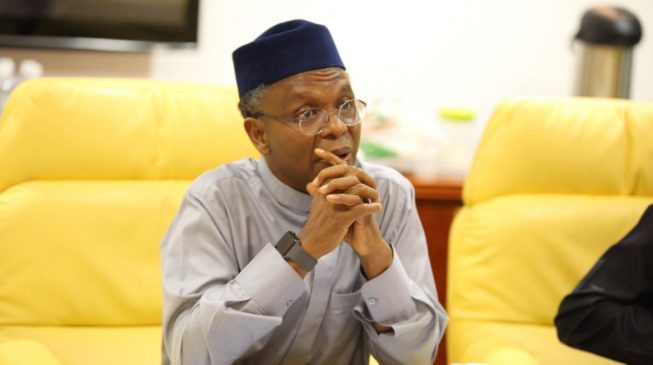
Kaduna State Governor, Nasir El Rufai, has faulted the idea of a uniformed or national minimum wage that was being determined by the federal government, saying each state should be allowed the pegging of its minimum wage according to the level of its income.
He spoke at the Nigeria Governors’ Forum (NGF) Secretariat’s 4th Annual National Peer Learning Event on Wednesday in Abuja.
The 36 state governors, under the aegis of NGF, had last week proposed N22,500 as the new national minimum wage.
However, in the report it submitted to President Muhammadu Buhari, on Tuesday, the tripartite committee on the review of the National Minimum Wage recommended N30,000.
Its chairperson, Ama Pepple, said “while noting the offer of N24,000 by government, the panel recommends N30,000 as the new National Minimum Wage of the country.”
But Mr El Rufai canvassed a review of the laws to allow states to determine what each should pay.
“If you look at the 1963 constitution, minimum wage was not in the inclusive list, it was added during the military rule.
“There are number of laws that were enacted during the military rule and there is a need to look at them and do something about them.’’
The governor however said the state had grown its annual IGR of N11.8 billion in 2015 when he assumed office to a total of N26.5 billion in 2017.
“In 2015 we collected a total N11.8 billion, in 2015 it jumped to N22.5 billion which was the first year of implementation of tax code; in 2016 it rose to N26.5 billion and as at the end of October 2018, we have collected N24.5 billion.
Mr El-Rufai listed some of the steps taken to increase to state’s IGR was the establishment of a tax code, the update and consolidation of the state tax laws from 1914 to date, as well as engaging consultants’ service to reform the state tax agency.
He said that also included the establishment of a new revenue collection agency which eliminated cash collection; as well as the constitution of the Joint Tax Board between the state and its local governments.
Mr El-Rufai said the objective of the state was to live within its means.
Also speaking, Governor Abdulfatah Ahmed of Kwara State said it was clear that the new minimum wage was coming with an added responsibility and the current revenue profile was not likely to take it on.
Mr Ahmed added that it was incumbent on all stakeholders in the governance of states to strike the necessary balance between economic and social costs of generating increased internal revenue through taxes, fees, levies and fines.
He said it was necessary as the nation prepared for a new minimum wage law which was expected to put even greater strain on states’ finances.
He however said his administration had achieved growth in its average monthly Internally Generated Revenue (IGR) from N600 million in 2015 to N2.2 billion in the first quarter of 2018.
Mr Ahmed said the state was confronted by difficult economic challenges in 2014 when its IGR dropped to an all-time low.
He said in the same year, the defunct Kwara State Board of Internal Revenue (BIR) made about N600 million, which could not augment the allocations to pay salaries or fund the state infrastructure.
“In that same year, a study of the infrastructure needs of Kwara State identified a N255 billion gap.
“This discovery led to the Kwara State Infrastructure and Financing Strategy, a comprehensive and targeted plan to systematically address the infrastructure deficit.’’
The deficit, according to the governor, made the government to embark on urgent financing strategies and reforms in its revenue generation.
He said the reforms included the passage of some laws, signing of the Kwara State Revenue Administration Law, and replacing the state BIR with Kwara State Internal Revenue Service (KWIRS).
“Based on these changes, KWIRS achieved growth in the monthly IGR from N600 million monthly as of 2015 to a monthly average of N1.45 billion in 2016, and a monthly average of 2.2 billion at the end of the first quarter of 2018.
“On account of these growths in our internal revenue, we have consistently been able to augment monthly federal allocation to ensure prompt payment of salaries.
“It also helped to fund major projects, introduce new ones and pay off existing debts owed to contractors in the state,’’ he said.
Speaking to journalists, Mr Ahmed said the current situation in the country called for sub-nationals to increase the revenue generating capacities.
Governor Godwin Obaseki of Edo State, in a presentation on “Mobilising Domestic Financing for Development’’ said his state had increased its monthly IGR from N600 million to N2.4 billion.
Mr Obaseki said what the state did was to engage revenue agents, consolidate collection into a single account, and to use technology to drive both assessment and collections.
He said the plan of the state was to grow its IGR by 50 per cent year-on-year.
Mr Obaseki added that the state IGR was linked to its infrastructure development plan, saying “you cannot improve IGR if there is no economic growth and one of the key drivers of economic growth is infrastructure.
“When you build roads, schools, hospitals, things that aid and enable businesses, you begin to see economic growth.
“As people do well, income goes up and businesses grow, then you have a basis to levy taxes which you will now have to improve the state.’’
(NAN)
END

Be the first to comment